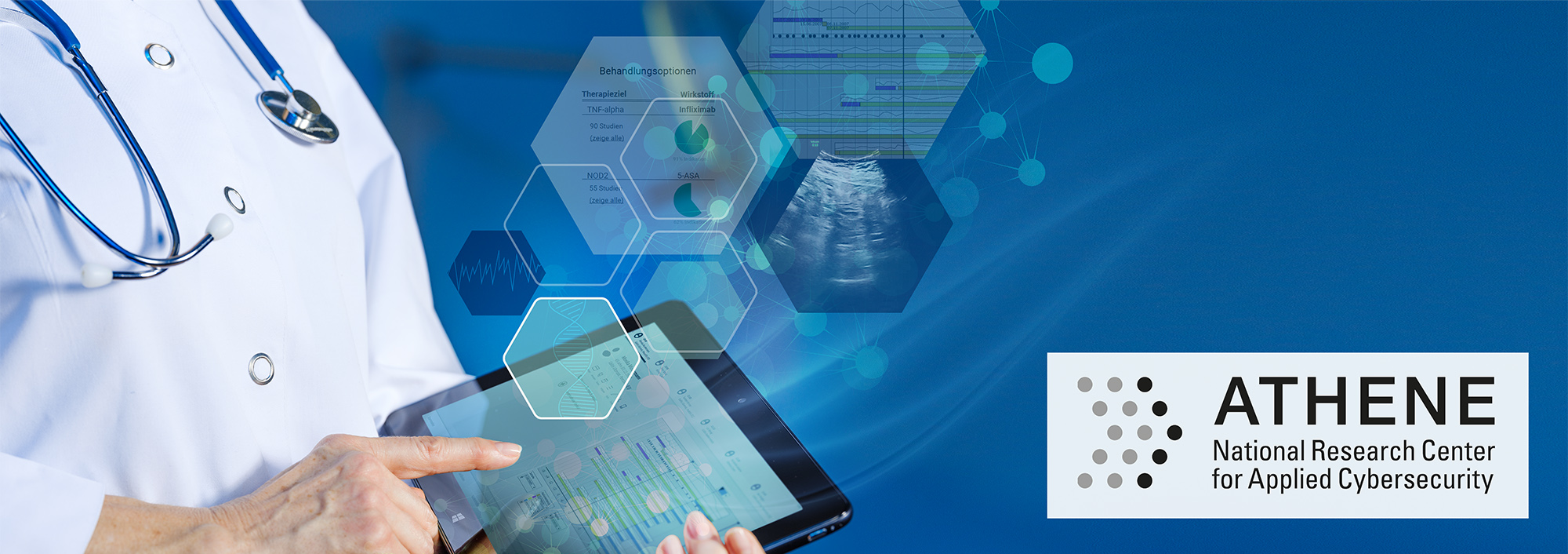Secure handling of patient data
Cybersecurity in medicine
Digitalization in healthcare offers great scope for even better patient care. With the push by the German Federal Ministry of Health to make electronic patient records (ePA) mandatory for everyone from the end of 2024, the debate surrounding the security of sensitive health data is gaining new momentum. Many patients are concerned that their data could fall into the wrong hands. As a participant in the National Research Center for Applied Cybersecurity ATHENE, the contribution being made by Fraunhofer IGD to the adoption of digitalization in the healthcare sector lies in the improvement of safeguards for data use. The Fraunhofer IGD team will be providing insights into the current state of research at the DMEA exhibition in Berlin during the week of 25th - 27th April.
Darmstadt: Patient data such as MRI scans, laboratory results and courses of therapy are currently circulated among various physicians and clinics. The way in which this is done is set to change fundamentally in the coming years. “As data sources become increasingly networked, this offers enormous potential for improving the quality of patient care and avoiding unnecessary duplication of examination,” says Professor Jörn Kohlhammer, ATHENE scientist at the Fraunhofer Institute for Computer Graphics Research IGD. “At the same time, however, the necessity of securing this data and the issue of data protection are coming in for even greater scrutiny.”
Data security during transmission, storage and long-term use
Professor Kohlhammer and a team based at Fraunhofer IGD and Fraunhofer SIT are addressing three key challenges concerning patient data: 1) secure transmission; 2) protection from access by unauthorized persons when stored in a Cloud solution; 3) the long-term secure maintenance of data when it exists only in digital format and no longer on paper. As head of Information Visualization and Visual Analytics, he is particularly concerned with the visual support of this data evaluation for medical professionals and patients.

Reducing complexity by means of visualization
“With the advance of digitalization, patients have the feeling that they are losing sovereignty over their data,” explains Professor Kohlhammer. It therefore comes as no surprise to him that less than one percent of people with statutory health insurance currently make use of the ePA. At the same time, doctors are also concerned that they will not be able to meet their complex legal obligations regarding data protection.
Fraunhofer IGD sees the answer as lying in targeted visualization of data protection information, of consent forms and of information about what data is available to whom and how it may be used. Professor Kohlhammer: “The simpler and more comprehensible this is made, the greater the acceptance of digitalization in the healthcare sector will be overall. The ePA is just the first step toward individualized medicine, which could permanently change the healthcare system through the use of artificial intelligence.”
Digital twin to link all health information
A current Fraunhofer project in this context is MeDiTwin (i.e. Medical Digital Twin). This makes the connection between the entirety of a patient’s health information and facilitates the comparison of parameters from population studies and data on specific disease patterns such as diagnostics, disease progression, medication or therapies of other persons displaying similar symptoms. The result is a holistic, digital patient model that not only makes all important data available to healthcare professionals at a glance, but also provides comprehensive, data-driven decision support at the same time.
“Strict attention to security aspects is indispensable in projects such as MeDiTwin,” says Professor Kohlhammer. “The ATHENE project is a step towards achieving this in the area of health data. Such matters are also important when considering the further development of data infrastructures. Additionally, the protection of data must also have top priority in any exchange between institutions.”
Secure Digital Transformation in Health Care
The National Research Center for Applied Cybersecurity ATHENE is the largest research body for cybersecurity and privacy protection in Europe. The Darmstadt-based Fraunhofer Institutes SIT and IGD are collaborating with TU Darmstadt, the Goethe University Frankfurt am Main and the Darmstadt University of Applied Sciences in ATHENE.
The topic of “Cybersecurity for Digital Transformation in Medicine” will be presented on behalf of ATHENE by the Information Visualization and Visual Analytics department of Fraunhofer IGD at the DMEA trade fair (Fraunhofer joint booth, Stand D107 in Hall 2.2).
 Fraunhofer Institute for Computer Graphics Research IGD
Fraunhofer Institute for Computer Graphics Research IGD